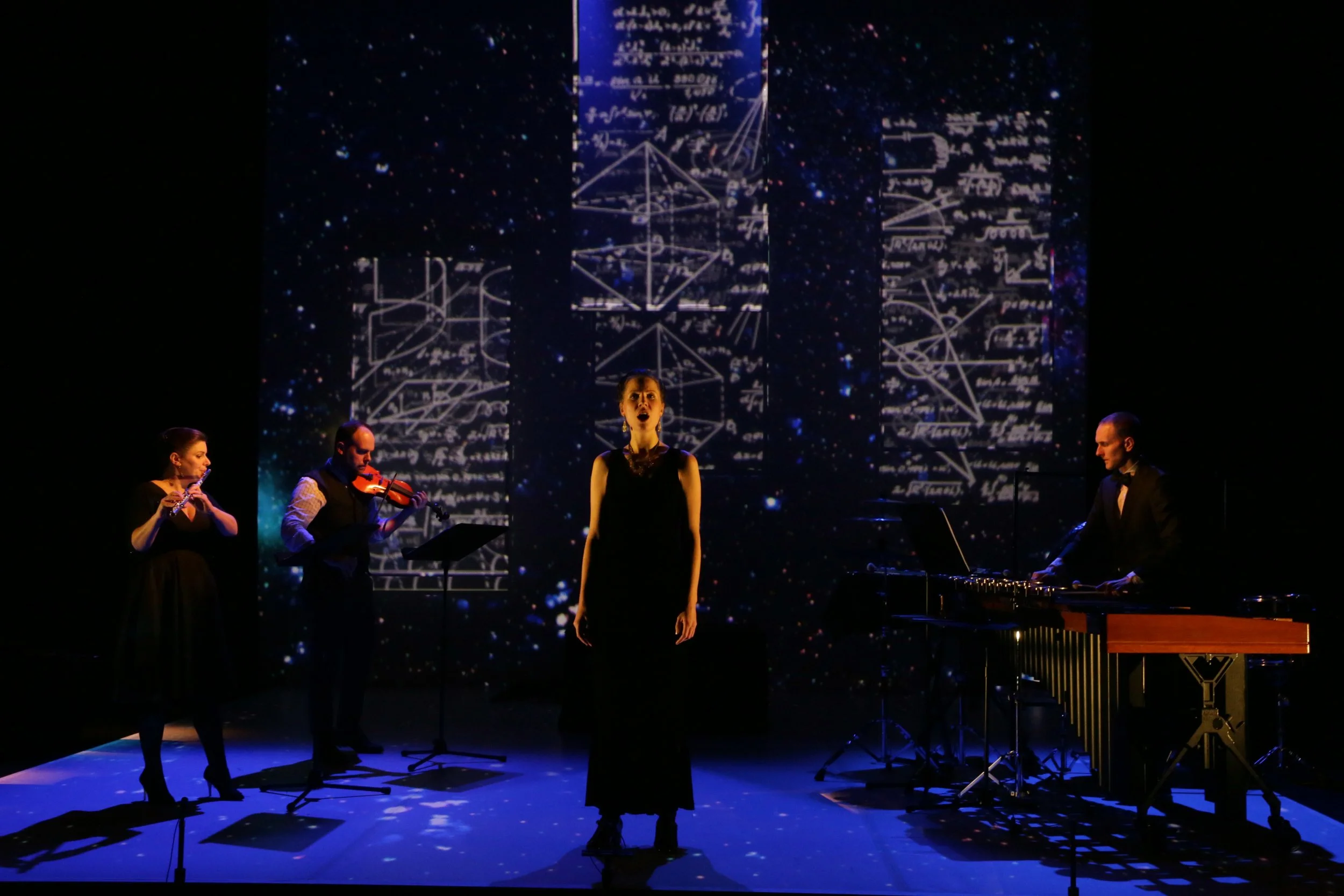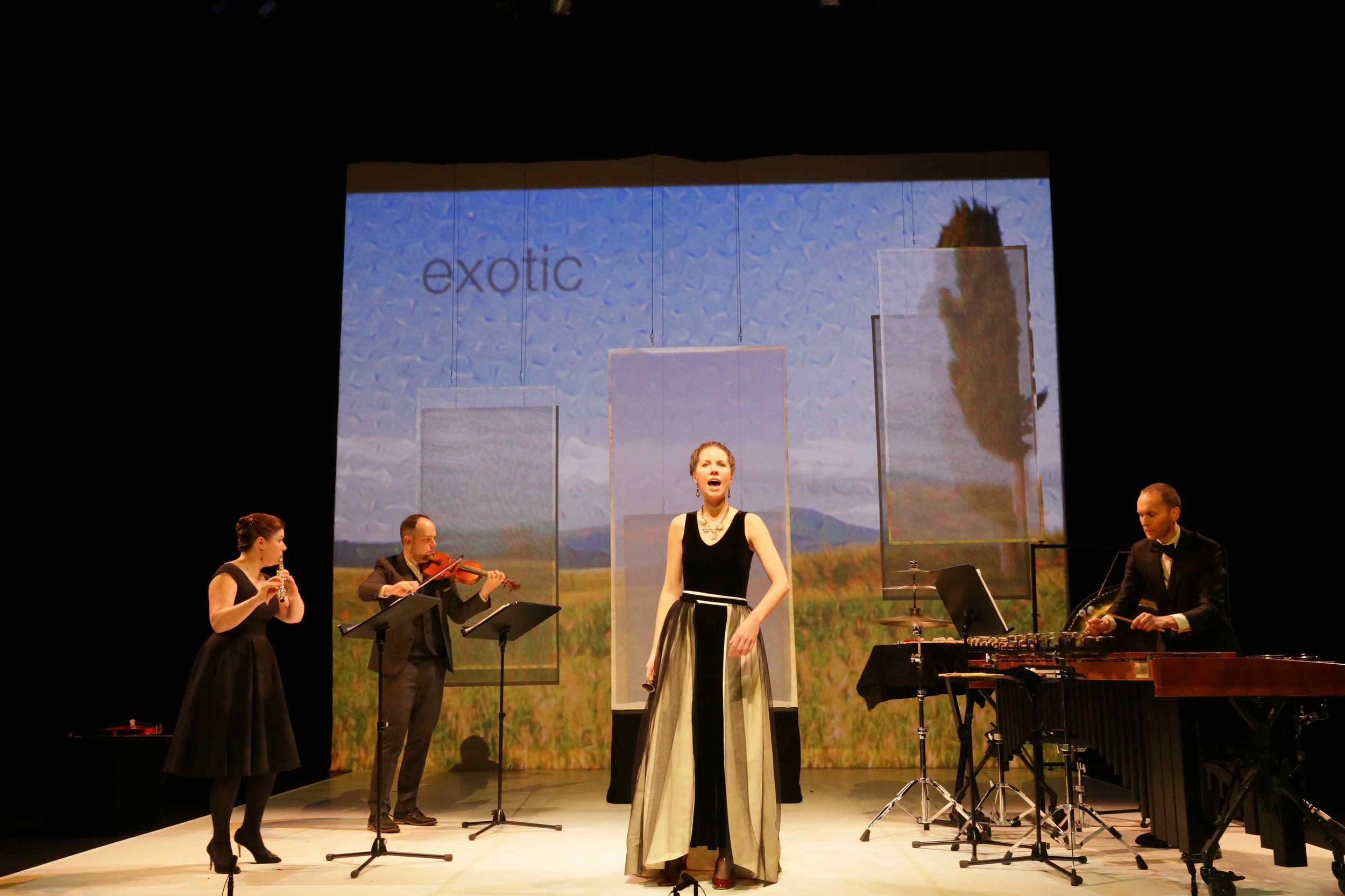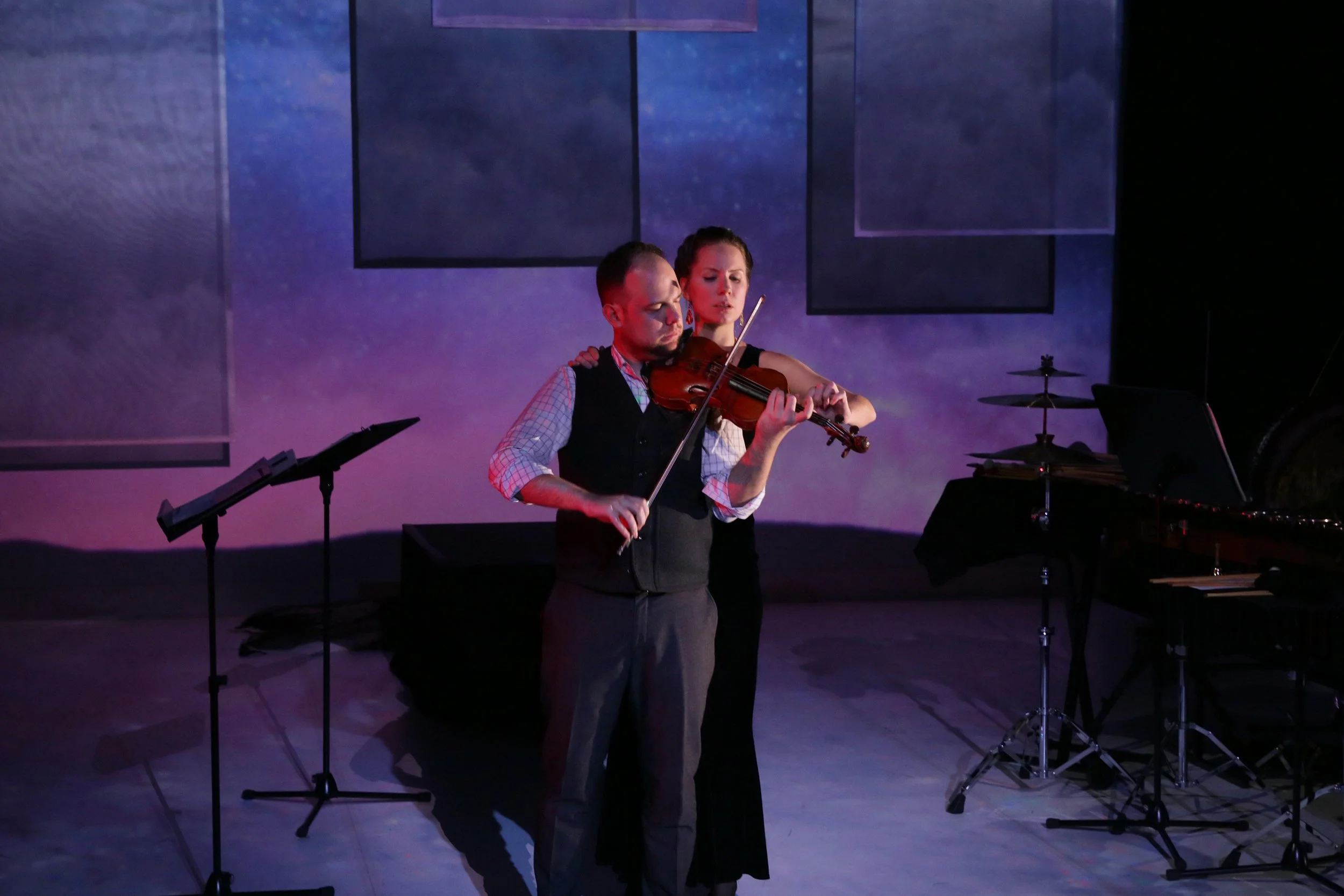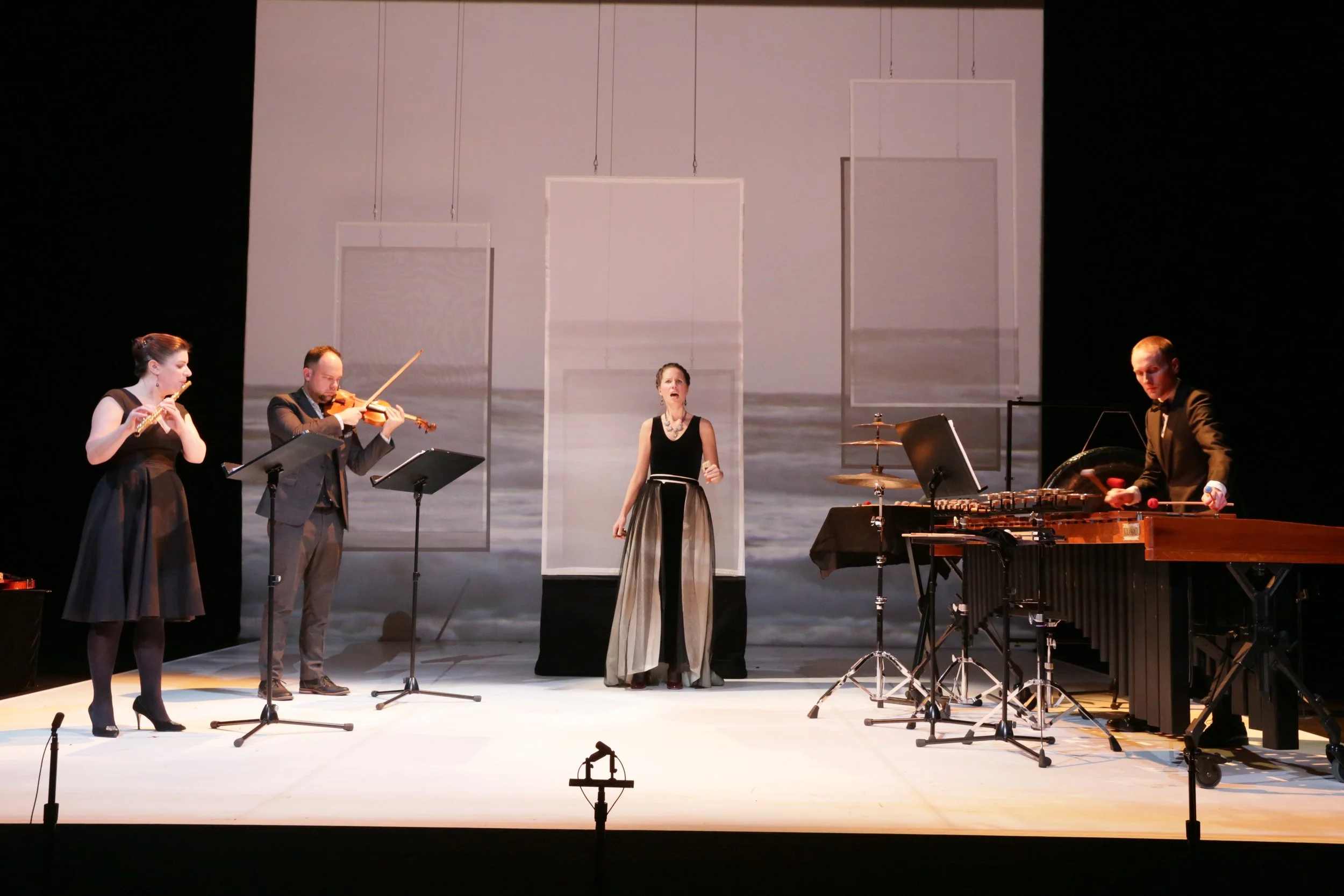
All Photos by Eric Brucker / EMPAC Rensselaer

I P S A D I X I T
IPSA DIXIT was a finalist for the 2017 Pulitzer Prize in music
Ipse dixit /Ip-suh dik-sit/: noun (Latin). Literally "he, himself, said it."
An uproven yet dogmatic statement which the speaker expects the listener to accept as valid without proof beyond the speaker's assumed expertise.
Ipsa dixit: "she, herself, said it . . ."
IPSA DIXIT (2016)
experimental music theatre, book and music by Kate Soper with additional text by various authors
Instrumentation: For soprano, flute, percussion, and violin
Duration: 90 minutes, no intermission
Premiere date/venue: December 9, 2016, EMPAC, Troy, NY, directed by Ash Tata
Premiere performers: Kate Soper (voice), Erin Lesser (flutes), Ian Antonio (percussion), Modney (violin)
Album: Kate Soper: IPSA DIXIT, New World Records (Cat. No. 80805)
For licensing of a fully-staged production, contact Caroline Kane at Schott Music Corporation
** Individual movements may be performed standalone **
Booking: For info about and tech rider for Wet Ink’s production of IPSA DIXIT directed by Ash Tata, please write to: booking@wetink.org


Program Note
Ipse dixit: noun (Latin). Literally "he, himself, said it." An unproven yet dogmatic statement which the speaker expects the listener to accept as valid without proof, due to the speaker's presumed expertise.
Ipsa dixit: "she, herself, said it . . .”
IPSA DIXIT is a genre-defying work of chamber music theatre that explores music, language, and meaning through blistering ensemble virtuosity and extended vocal technique. Developed over six years of collaboration with the Wet Ink ensemble, the piece uses elements of monodrama, Greek tragedy, and performance art to skewer the treachery of language and the questionable authenticity of artistic expression.
Production History
With the Wet Ink Ensemble/Ash Tata, director
December 2016: EMPAC, Troy NY
February 2017: Dixon Place, NYC
October 2018: Miller Theatre Portrait Concert, NYC
March 2019: University of Northern Colorado
September 2021: PS21, Chatham NY
March 2025: Big Ears Festival, Knoxville TN
Selected other productions
April 2019: Original Gravity Series, Brookline MA (semi-staged)
March 2023: Seattle Modern Orchestra, Seattle WA, dir. Neil Parsons
October 2023: Library of Congress (excerpt, unstaged)
July 2024: Long Beach Opera, Long Beach CA, dir. James Darrah
January 2025: Taos Chamber Music Group, Taos NM

Individual Movements
I. Poetics
II. Only the Words Themselves Mean What They Say
III. Rhetoric
IV. The Crito
V. Metaphysics
VI. cipher

I. Poetics
For soprano, flute, percussion, and violin
Text by Aristotle (abr./trans. Soper) and Sophocles
Premiere: May 3rd, 2015, Smith College, Northampton, MA
Program Note
Aristotle's Poetics is one of the earliest works of literary theory: a manual on how to make good tragedy. Here, Aristotle's instructions are duly reenacted by the ensemble under the unquestioned authority of the soprano--until an unexpected mutiny unearths the warning within Aristotle's favorite tragedy, Oedipus Rex: how can we ever truly count ourselves happy, when at any moment catastrophe might strike?

II. Only the Words Themselves Mean What They Say
For soprano and flute
Text by Lydia Davis
Premiere: February 11, 2011, Tenri Cultural Institute, NYC
Program Note
Only the Words Themselves Mean What They Say uses three fabulously quirky, slyly profound texts by Lydia Davis to test the limits of expressive technique. Exploding Davis’ words into unhinged virtuosity, the flute and voice amplify each other to dizzying planes of intensity and insanity, as the players struggle together to navigate the treacherous labyrinth of emotional logic.

III. Rhetoric
For soprano, flute, percussion, and violin
Text by Aristotle (abr./trans. Soper) and Soper
Premiere: September 10, 2015, Roulette Intermedium, Brooklyn, NY
Program Note
Aristotle's Rhetoric was the first treatise to lay out the ground rules for the art of persuasive speech. But a close examination of the text yields some unsettling themes: that being honest and acting honest are indistinguishable, as are proving and merely seeming to prove. And yet, in the midst of this moral equivocation, Aristotle makes a startling claim: that whoever is telling the truth in a debate has a natural advantage. "Rhetoric" searches for this advantage, by placing the text amidst some of music's most dependable rhetorical devices, from triads to twelve-tone rows, and finally by stripping it bare of device – and of music – altogether.

IV. The Crito
For soprano and percussion
Text by Plato (abr./trans. Soper) and Robert Duncan
Premiere: October 28, 2012, Willow Place Auditorium, Brooklyn, NY
Program Note
The Crito depicts a conversation between Socrates, who awaits execution on charges of corrupting the youth, and his friend Crito, who has come to Socrates’ prison cell to break him out. As they discuss their options over a collapsing marimba ostinato, Socrates suggests they consider whether escaping would be right, even in the face of an unjust death sentence. But in voicing the hypothetical arguments of the personified Laws, Socrates becomes so swept up in his own rhetoric that he succumbs to his invented interlocutors. He will stay and be executed not because the law is right, but because he is overwhelmed by the power and fury of its voice.

V. Metaphysics
For soprano, flute, percussion, and violin
Text by Aristotle (abr./trans. Soper)
Premiere: April 19, 2016, St. Anselm College, Manchester, NH
Program Note
Aristotle's Metaphysics asks what we can know. A chamber quartet tackles this premise by deconstructing the act of performance itself in the name of Aristotelean logic, swapping instruments and taking them apart in the search for fundamental meaning--and then releases the question into the intellectually impenetrable realm of pure music.

VI. cipher
For soprano and violin
Texts by Guido d’Arezzo, Pietro Bembo, Michael Drayton, Sigmund Freud, Jenny Holzer, Sarah Teasdale, and Ludwig Wittgenstein
Premiere: December 13, 2011, Paula Cooper Gallery, New York, NY
Program Note
Cipher wends its way along the slippery slopes where language and music and meaning collide, exposing the inherent ambiguity of musical temperament, ensemble hierarchy, and lyric comprehension via several centuries of linguistic investigations. Visual artist Jenny Holzer prepares a rationale; Ludwig Wittgenstein warns of conundrums; Renaissance humanist Pietro Bembo fêtes the phonemes; Sigmund Freud scrutinizes dream reality; and Jenny Holzer reappears with a moral that may not be as forthright as it seems: "people can understand you when you say something."
Stage/Monodrama • Vocal [ Voice plus one • Voice(s) and Ensemble ] • Large Ensemble • Small Ensemble • Multimedia • Misc
Please contact me if you would like to perform something not published here.





